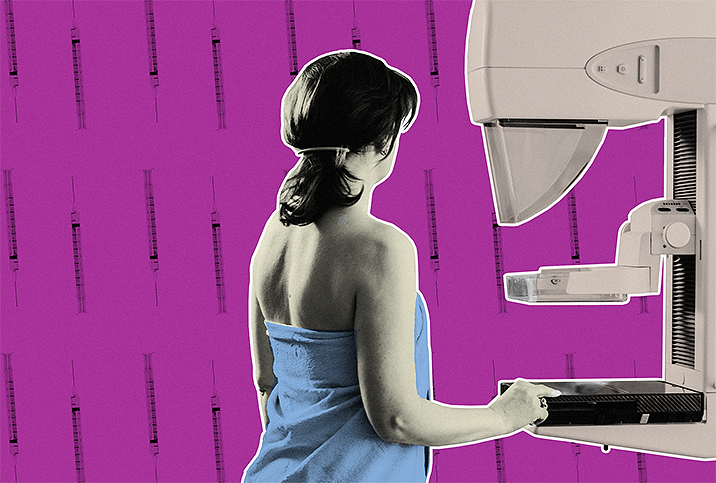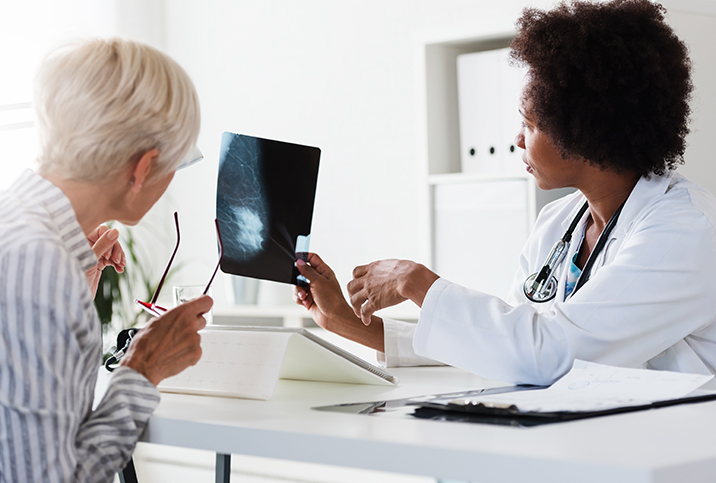Mobile Mammography Brings Breast Cancer Screening to Patients

It's hard to miss Seattle Cancer Care Alliance's bright yellow, white and teal mammogram van, also known as the MammoVan. And that's entirely intentional.
"We're bringing it to the community and making it hard to ignore," said Jovanna McKinney, M.S., manager of SCCA's mobile mammogram program. "You can't do that as well with a table at a health fair. That's great, but a 40-foot RV, that's pretty, pretty hard to ignore. It gets people interested and talking about things like mammograms."
Access for all
Since 2010, the MammoVan has traversed the Seattle area to make mammography screening for breast cancer easy and accessible for all women. The van serves about 300 to 400 patients a month, or 4,000 to 5,000 a year.
McKinney explained that "multifaceted barriers" often prevent women from getting an annual mammogram: time, transportation, location, expense, anxiety. The more vulnerable residents of King County, including non-English speakers and those who are under- or uninsured, have even greater hurdles to accessing care.
"The goal is really to provide easy access to screening mammography for women where they live, where they work, where they do their errands, because everyone has busy schedules," said Diana Lam, M.D., a breast radiologist, assistant professor of radiology at the University of Washington, and the interim clinical director of SCCA's breast imaging clinic.
Utilizing the latest technology
The technologists who work in the MammoVan are the same ones patients might see at a brick-and-mortar SCCA center. The technology is as cutting-edge, as well: screening mammography with tomosynthesis (3-D mammography).
Patients can make an appointment or get a screening on the spot. The results are typically reported the next day, and patients are mailed a letter explaining the findings. They can also access their results through a mobile app.
"For the majority of patients, it's good news. There's nothing abnormal for those patients," Lam said. "When we identify something where they need further workup, we have a coordinator at the SCCA who will then call the patient to let them know and help schedule additional appointments."
Why mammograms matter
In the 1980s, mammography was shown to be an effective way to screen for breast cancer. Since then, the percentage of women age 40 and older who've had a mammogram within the previous two years has increased significantly: from 28.7 percent in 1987 to 66.7 percent in 2018, according to the Centers for Disease Control and Prevention (CDC).
The American Cancer Society recommends women have an annual mammogram starting at age 45, or earlier for those with elevated risk factors, including a first-degree family history of breast cancer or the presence of the BRCA genetic mutation.
Besides skin cancer, breast cancer is the most common type of cancer in women. It is also the second-leading cause of cancer deaths in women, following lung cancer. Death rates from breast cancer have declined in the past 15 years, in large part due to increased public awareness and earlier detection from mammograms.
The mobile mammography difference
Research has found mobile mammography can be an effective way of reaching medically underserved women. Seattle's MammoVan isn't the nation's only mobile mammography program. Others exist in many major metropolitan areas, including Houston, New York City and Boston, as well as in some rural parts of the country.
In Pennsylvania, patients can visit the Lehigh Valley Health Network's pink MammoCoach. Since 2018, the MammoCoach has screened patients from 19 counties, said Erin Yaworski, LVHN's mobile mammography program coordinator.
In addition to offering mammograms, the MammoCoach and its staff participate in community outreach and awareness events, where they give tours of the coach so people can see it's a lot more than just a truck in a parking lot.
"They realize it's the same equipment, it's the same technology, it's the same staff and it's the same imaging," Yaworski said. "We just make it more convenient for them and bring it closer to them."
Yaworski said many of the MammoCoach's patients appreciate the ease of not having to worry about parking or navigating a large, complex medical center. Only one or two patients are seen at a time, providing a more private, relaxed environment, and they can talk with and ask questions of the staff during their screening.
"A lot of women put off getting their mammogram because they've had a bad experience, they suffer from anxiety or they know someone who's had breast cancer," she said. "They're afraid that somebody's going to find something, and that's why they put it off. We can bring them into a more intimate experience and allow them that one-on-one time where they don't feel rushed and they feel like they can ask questions. We encourage all of our patients to talk to our mammography technologist to make sure that they feel comfortable and don't leave there feeling like, 'Oh, my gosh, I have no idea what my next steps are.'"


















